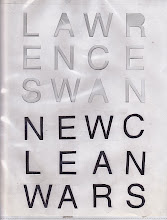Sunday School 6/22
River baptism performed by my father in Florida in 1980.
Today's reading from Matthew:
Baptism and temptation of Jesus
Matthew, Mark, Luke, and John all quote Isaiah and identify John the Baptist as the voice crying in the wilderness, but Mark's quote begins with a phrase from the prophet Malachi: "See, I am sending my messenger ahead of you, who will prepare your way." The other writers "correct" Mark's quote and leave that out, but all four canonical gospels introduce John the baptizer with Isaiah's "voice of one crying out in the wilderness: 'Prepare the way of the Lord, make his paths straight.'" This is where Mark begins his gospel. Mark and Luke also say John preached repentance, but only Matthew reports JtB as saying "Repent, for the kingdom of heaven is at hand." They all quote John saying he is unworthy to carry or untie the sandals of the one who is coming after him. John wore clothes made of camel hair and a leather belt like Elijah and ate locusts and honey and baptized people in the Jordan River. Like Malachi, he may have been directing his prophetic criticism primarily against the corrupt priests, particularly the Sadducees, calling for their purification and change of mind, a transformation symbolized in the ritual of baptism. The one who comes after him will baptize with the Spirit (in Mark) or with the Spirit and fire (in Luke and Matthew). Baptism in the Spirit means a change of consciousness, and a new way of thinking, not just a change of behavior, but fire implies God's judgment on his people, or on the ruling class: "His winnowing fork is in his hand, and he will clear his threshing floor and will gather his wheat into the granary; but the chaff he will burn with unquenchable fire" - this is in both Matthew and Luke. I think this is an interpretation added by the second generation of the Jesus movement, an attempt to find meaning in the destruction of the Temple and the Temple-centered religion. Matthew and Luke both say that it is useless to claim privilege in being descended from Abraham, because God can make sons of Abraham out of rocks.
It is not enough to copy out different stories about Jesus and what he said and what happened to him. Matthew and Luke used Mark's gospel and some other accounts that they regarded as credible plus a written or oral record of what he said. The gospel writers are collecting the teachings of the first generation of the Jesus cult. A couple centuries later, church elders get together and determine which Christian writings are credible - but what does that mean?
I know little about the early christians. This is what I think - Jesus had a teaching and a worldview and a set of practices and performances, a constant, improvised street theater as well as his routine of parables and paradoxes which he taught his disciples. Jesus appeared at a time of revolutionary upheaval against the occupying superpower and its puppet dictator and corrupt ruling class. There are rival groups, including a ruling class of priests plus Jews who work for the state plus revolutionaries who carry on the prophetic tradition and even the oriental intelligentsia are expecting a new king, anointed by the Creator to liberate his people.
Matthew's stories ( like the massacre of the innocents) are understood to have biblical significance. Just like when Moses was born, a massacre occurs to stop the birth of the new liberator. Elijah, or someone dressed like him, appears in the wilderness and crowds of people come to him to be initiated into the movement that will prepare the way for the kingdom of heaven, the revolutionary utopia conceived by an unmarried girl who was accepted by a the boy who married her, because of what an angel told him in a dream, and their son grows up and goes to be baptized by this revolutionary who is calling for a purification of the cultic practices and demanding social justice (Luke has JtB tell his followers to become communists). Only Matthew has JtB direct his accusations at the Pharisees and Sadducees. This might reflect conflicts among second generation Jewish christians in the last third of the century. The ex-Pharisee Josephus wrote respectfully of John the Baptist, who, he says, Herod considered to be a threat. He describes the Sadducees as a ruling elite who ran the Temple as well as everything else. They disappeared after the destruction of the Temple, but the Pharisees, built the base of what we now call Judaism, I guess.
Jesus is baptized and all four gospels say the sky opened and the Spirit of God descends like a dove and a voice says, This is my beloved son, etc., only John's gospel tells this as something JtB experienced, his personal revelation of Jesus as son of God. Jesus submitted to the ritual of initiation into the movement led by John and John believed Jesus was the next stage, the one he was preparing the Way for by calling for the purification of the ruling priestly class who serve the empire and exploit their own people. Whatever "the kingdom of heaven is," it is neither the kingdom of Herod or Caesar.'
Emulating Moses, Jesus fasts for forty days in the wilderness. Moses wrote down the ten commandments when he did that. Mark says very little about Jesus' vision quest following his baptism: "And the Spirit immediately drove him out into the wilderness. He was in the wilderness forty days, tempted by Satan: and he was with the wild beasts and the angels waited on him." To that spare account Matthew and Luke add the story of the three temptations. The scriptures Jesus/Yeshua uses to battle Satan all come from Deuteronomy and the context is Moses calling on Israel to obey God's laws and remember their deliverance from Egypt, and recalling the forty years in the wilderness before Israel was led across the Jordan River by a leader named Joshua/Yehoshua/Yeshua. Maybe the significance of John's baptism practice was in the symbolism of its location, as if he is calling Israel to reinvent itself by returning to the wilderness, re-crossing the Jordan, and retaking the Promised Land?



0 Comments:
Post a Comment
<< Home